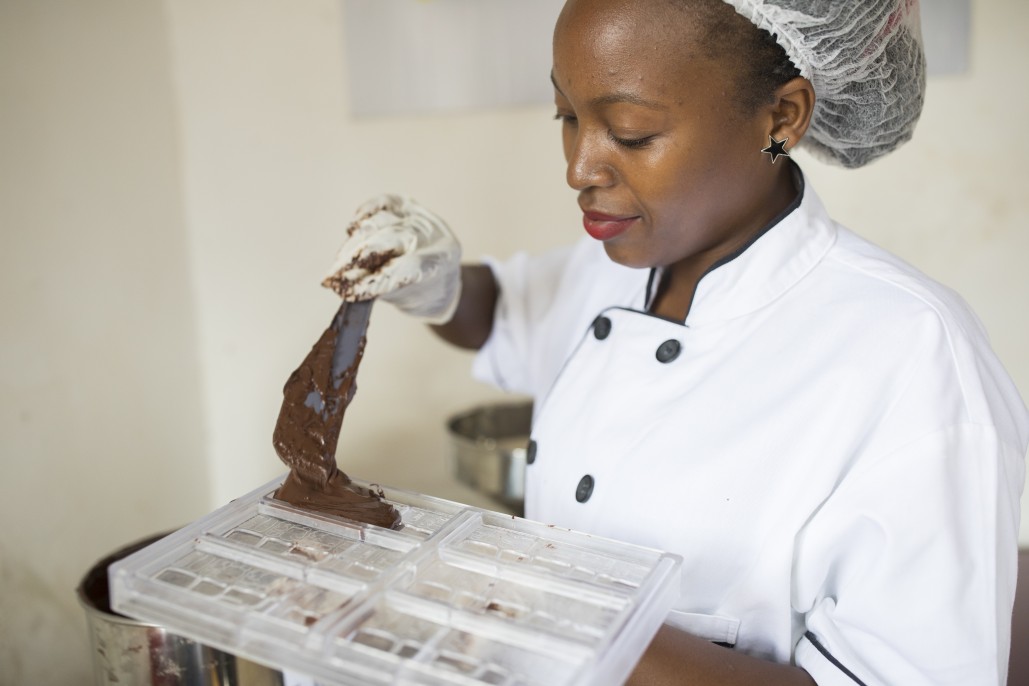PAYING THE PRICE FOR COCOA IN AFRICA
03 October 2019
If you bite into a bar of chocolate today, it is highly likely that the cocoa beans used to make it were grown in West Africa. This is because two thirds of chocolate consumed worldwide include beans from this region.
However, far from being a lucrative choice of livelihood, cocoa farmers remain at the mercy of an industry that has an eye on price, and is a slave to margin. Coupled with this, cocoa prices have slumped by 30% to hit a ten-year low, leaving many farmers existing on far less than the living wage.
The Fairtrade Foundation launched a new campaign on the theme of the living wage to coincide with this year’s Fairtrade Fortnight. They state that in Ghana and Côte d'Ivoire, a typical farmer, working outside of fair trade, lives on around 75p per day. That is below the World Bank’s extreme poverty line of about £1.40 per day.
Facing another year of financial hardship, government bodies in Côte d'Ivoire and Ghana threatened to stop their cocoa supply, should they not meet a minimum price of 2,600 USD per tonne. Following a number of negotiations, the two governments settled for a fixed price premium of 400 USD above the predetermined Cocoa Futures contract price, which is the world benchmark for the global cocoa market. The Cocoa Futures price fluctuates on a daily basis, however farmers growing Fairtrade cocoa will continue to be protected by the Fairtrade International Minimum Price of 2,400 USD per metric tonne, so will never receive less than this at the point of export.

According to John Dossou, our Lending Manager for West Africa, there is still a great deal of uncertainty for farmers. He said:
“Most of our producers in Ghana and Côte d'Ivoire have welcomed the good news. They hope that the fixed premium will be used to address the issues in cocoa farming communities in the region. However, some of them are sceptical about how much of the increase is actually going to affect the producer price.”
It is expected that consumers may absorb the increase in price as opposed to the large multinationals, with predictions of a chocolate bar price rise as products hit the shelves. As the increased market price has proved to have an impact on public consumption in the past, there may be consequences for farmers in the longer term. For example, in 2015, cocoa consumption slumped after the market price rose to 3,000 USD per tonne, rising again in 2017 as prices dropped to 2,000 USD. Sadly, it seems like a no win situation for cocoa producers who currently only receive about 6% of the value of the global chocolate industry.
The Ghana Cocoa Board (Cocobod) and Côte d'Ivoire's Coffee and Cocoa Council joined forces and announced their minimum price for cocoa this summer. The move comes two years after both regions agreed to set up a joint industry body called Ghana-Cote d’Ivoire Sustainable Cocoa Initiative to tackle issues such as pricing and discourage cross-border smuggling. Originally viewed as rivals by the cocoa industry, the countries now work together to create a larger influence on world cocoa prices. Only time will tell if this latest move is sustainable. However, as detailed in the most recent Fairtrade Foundation Annual Report, ‘strengthening producer organisations in West Africa continues to be a major focus.’

Unfortunately, an even more serious implication has arisen from the global chocolate industry. As people living in West Africa have very little choice of commodities to sell, deforestation is taking place on a grand scale as some farmers turn to illegal production to benefit from cocoa’s growing demand. The spread of unlawful plantations has caused devastation as farmers move into national parks and protected areas to grow their crop. Consequently, there is growing pressure on chocolate brands to be more transparent about their supply chain.
As Fairtrade Foundation state in their aforementioned report: “Both Aldi and Lidl have agreed with us to increase the use of Fairtrade cocoa in their confectionary lines.”
Global campaigning organisation, Mighty Earth conducted an in-depth global investigation into the link between cocoa and deforestation, and concluded that ‘without action, Ghana stands to lose all remaining forests outside its national parks in the next decade…. In Côte d'Ivoire, only 200-400 elephants remain from an original population of hundreds of thousands.’
We spoke with Traore Sinan, the chairperson of CAYAT, which is one of our largest cocoa producers in Côte d'Ivoire. We asked about the environmental challenges of their work. The co-operative holds yearly environmental training for their members focused on climate change adaptation and mitigation. Traore explained that there are several classified forests in their region and CAYAT is working in partnership with the Ministry of Water and Forests to preserve these areas.
As consumers increasingly choose groceries produced with a conscience, there is some hope that positive changes lie ahead. Over the past five years, sales of ethical food and drink have shot up by 43% (source: Mintel, May 2019.) In fact, this year 100% Fairtrade brand, Divine Chocolate announced its highest ever sales; proof that chocolate lovers are gradually becoming more concerned with the social impact of the cocoa supply chain.